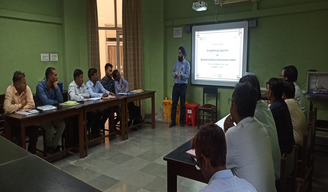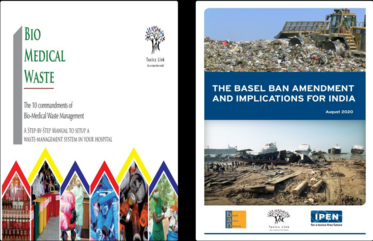Toxics Link, a not-for-profit initiative of The Just Environment Charitable Trust based in New Delhi, India, emerged from a critical need to address a vacuum that existed on the issue of toxicity and its impact on life and environment. Toxicity has significant health and environment impacts, particularly on vulnerable social groups such as women, young people and the urban poor. The cross-sectoral nature of the issue entails engagement with a range of concerns, such as health, environment, occupational safety, social justice, choice of technologies and process, consumer awareness, etc.
Since its conception in 1994, Toxics Link’s role has revolved around the basic function of generating and disseminating credible information on waste and toxic substances across diverse social, economic and political groupings. The focus on information and communication, though, would have remained incomplete without the logical extension of fostering change through consensus-based alternatives towards cleaner, safer and toxics-free practices and approaches. Often, the organisation has implemented best-practice models, besides promoting concepts and ideas of change.
A guiding strategic outlook is of approaching each engagement as an integrating exercise, which brings together stakeholders on the basis of credible research and accurate information. Government agencies, communities and the larger sector itself are important participants in this dialogue for an equitable and safe environment. From policy-makers to grassroot activists and from housewives to experts, Toxics Link has established an extensive outreach by employing a diverse range of communication platforms and strategies.
Toxics Link has been playing a vital role in connecting experts, civil society groups and individuals working nationally and internationally on issues related to toxics, both to each other as well as to other sectors. The organisation has forged a national network of over 1,600 individuals and group members to share the vision of a toxics-free world. Through these, and through its nodes in Mumbai and Chennai, the group has not only pioneered campaigns and facilitated changes at the national and regional levels, but has also emerged as the voice of the global south in international discourses on toxicity and equity. Today, these discussions have come to be integrated into the broader discourse of sustainable development.
Historically, the organisation has developed expertise in the management of municipal, medical and hazardous waste. With the changing interface between man and the environment, new issues like electronic waste, mercury and heavy metals have also been taken up. As a part of several key global alliances, issues of pesticides and Persistent Organic Pollutants (POPs) and food safety, among others, have seen us enrich international forums with vital inputs from transitional economies.
Toxics Link attempts to continuously assess the issue of toxicity as it plays out on the ground in everyday life. This allows creation of new researched information that is dynamic and result-oriented.
Among Toxics Link’s earliest involvements was work in bio-medical waste, an area which had largely been unaddressed during India’s move towards modernity. A successful campaign orchestrated by the organisation resulted in the framing of the nation’s first legislation on the issue – the Biomedical Waste (Management and Handling) Rules, 1998.
It’s a daunting field of work. Healthcare has many lacunae in the world’s second most populous nation, with basic aspects such as adequate medical staff, infrastructure and availability of medicines yet to be fully addressed. In such a scenario, waste anagement often takes a low priority. The nature of bio-medical waste, with its multiple sources, coupled with low awareness and knowledge amongst stakeholders have made its management complex and difficult.
Toxics Link has been working towards making health-care delivery hazard-free
by replacing toxic products, processes and technologies by cleaner and safer non-burn medical waste treatments technologies, combined with waste segregation at source.






